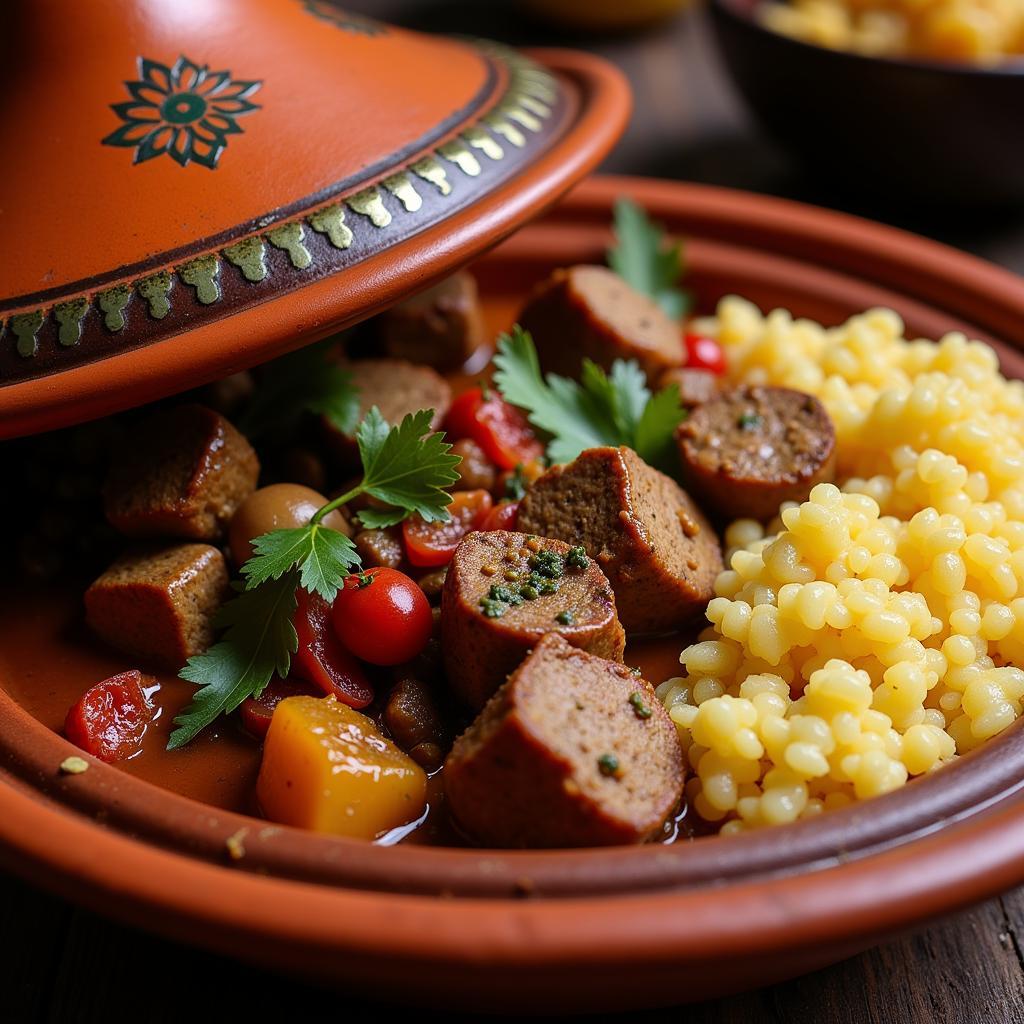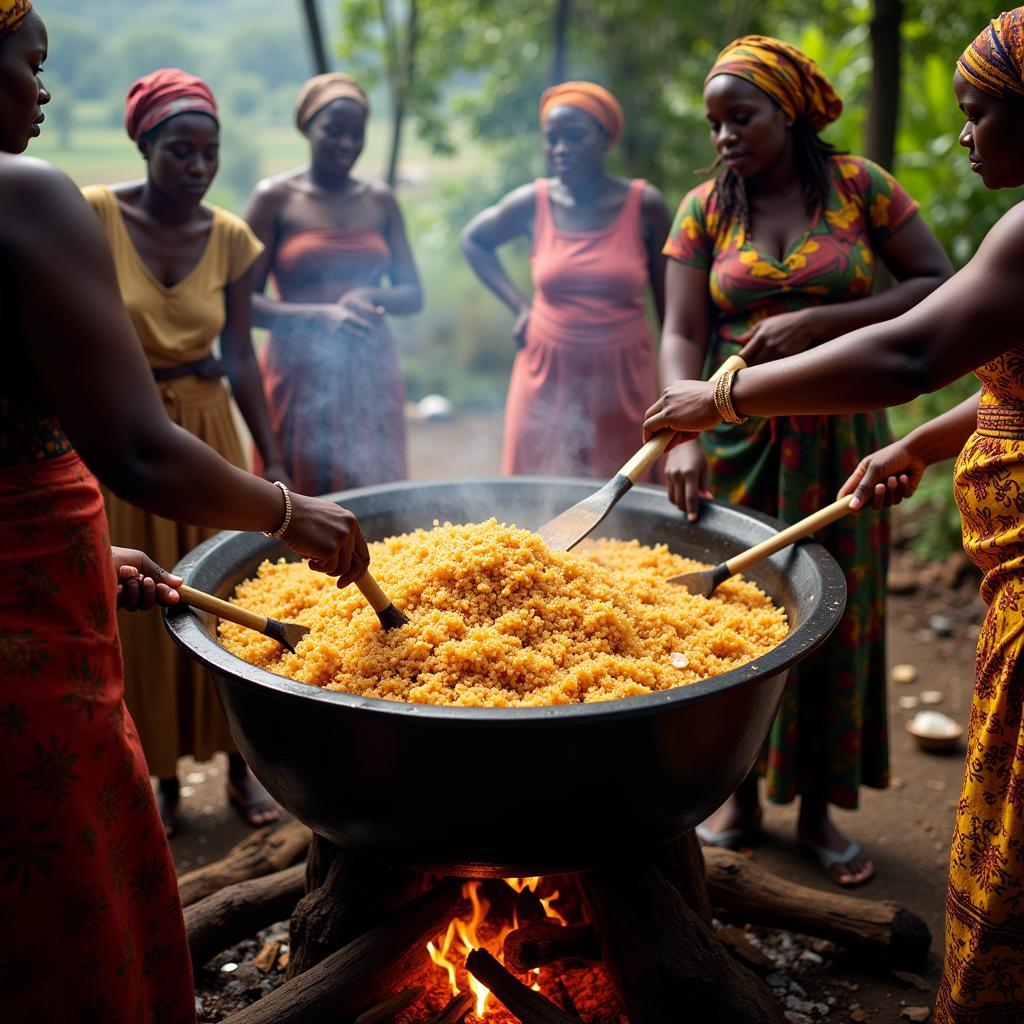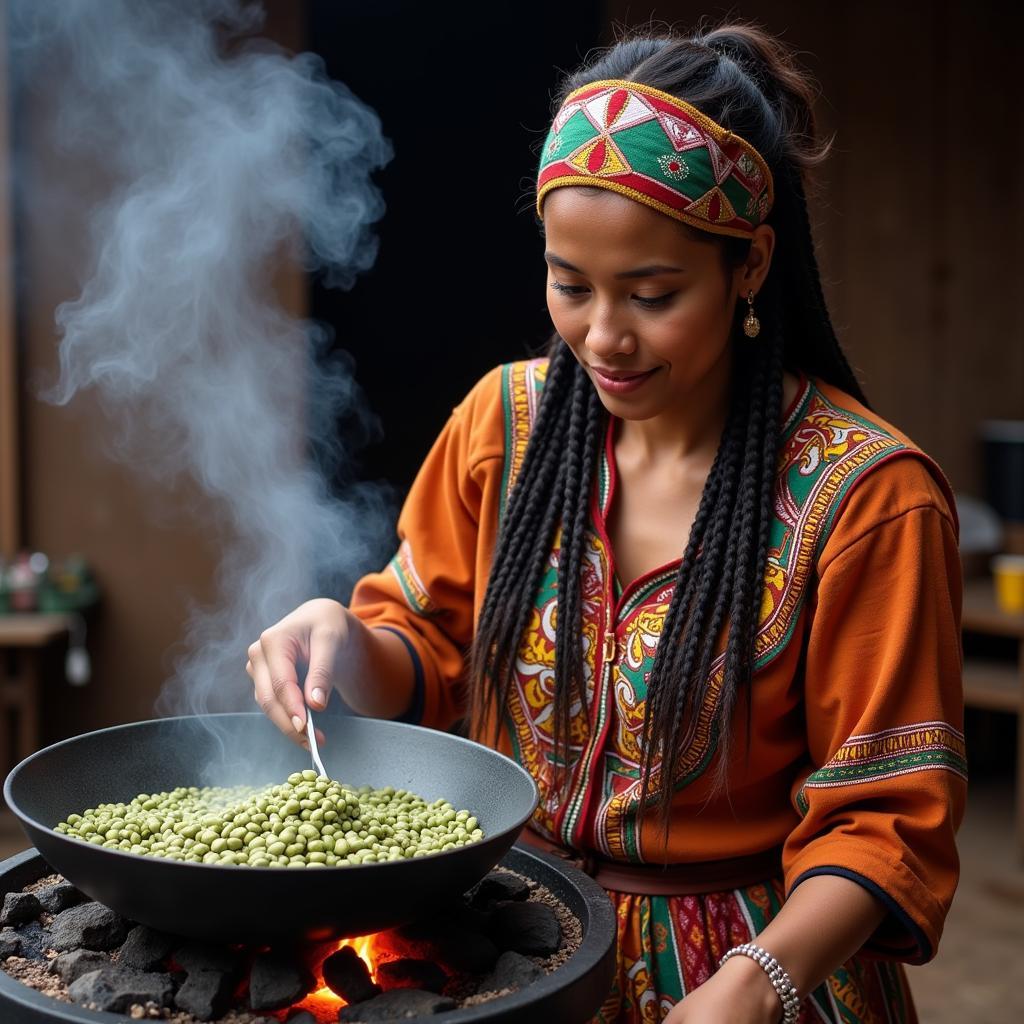African Food And Culture are deeply intertwined, offering a vibrant tapestry of flavors, traditions, and stories. From the bustling marketplaces of Marrakech to the serene villages of the Serengeti, the continent’s diverse culinary landscape reflects its rich history and unique regional identities. This journey into African food and culture will tantalize your taste buds and broaden your understanding of this captivating continent.
A Continent of Flavors: Regional Variations in African Food
African cuisine isn’t a monolith; it’s a mosaic of culinary traditions shaped by geography, climate, and cultural exchange. North Africa, with its proximity to the Mediterranean, boasts fragrant tagines, couscous, and the sweet allure of dates. West Africa explodes with vibrant flavors, featuring dishes like spicy jollof rice, hearty groundnut stews, and the ubiquitous fufu. Moving east, you’ll encounter influences from the Indian Ocean, resulting in flavorful curries and the use of exotic spices. Southern Africa is known for its braais (barbecues), biltong (dried cured meat), and the unique flavors of indigenous ingredients. These regional variations highlight the incredible diversity of African food and culture.
Want to explore the diverse flavors of a specific region? Check out our safari food menu.
 North African Tagine with Couscous
North African Tagine with Couscous
Staple Foods and Ingredients: The Foundation of African Cuisine
Certain ingredients form the backbone of many African dishes, providing nourishment and a distinct character. Cassava, yams, and plantains are essential carbohydrates, often served boiled, fried, or mashed. Millet, sorghum, and maize are important grains, used in porridges, breads, and alcoholic beverages. Legumes like lentils, beans, and peanuts provide protein and contribute to the rich, earthy flavors of many stews and sauces. And of course, the vibrant spices – from fiery chili peppers to fragrant cumin and coriander – add depth and complexity to countless African dishes.
Beyond the Plate: The Cultural Significance of Food in Africa
Food plays a vital role in African culture, far beyond mere sustenance. Meals are often communal affairs, bringing families and communities together to share food and conversation. Specific dishes are associated with celebrations, rituals, and ceremonies, further solidifying the link between food and culture. Traditional cooking methods, often passed down through generations, preserve cultural heritage and connect people to their roots. Understanding these traditions offers a deeper appreciation of African food and culture.
 West African Jollof Rice Preparation
West African Jollof Rice Preparation
The Influence of African Food on Global Cuisine
African food has made a significant impact on global cuisine, influencing flavors and dishes around the world. The transatlantic slave trade brought African ingredients and cooking techniques to the Americas, contributing to the development of soul food, Caribbean cuisine, and Brazilian food. Today, African-inspired dishes are gaining popularity in restaurants and homes worldwide, introducing new flavors and expanding culinary horizons. Check out our puerto rican food truck near me to see the African influence.
What are some popular African spices?
Many spices contribute to the rich tapestry of African flavors. Some of the most popular include cumin, coriander, ginger, turmeric, cinnamon, cloves, nutmeg, and various chili peppers.
How is food prepared in different parts of Africa?
Food preparation varies widely across Africa, reflecting the diverse cultures and resources of each region. Methods range from simple boiling and roasting to complex stews and sauces. Traditional cooking equipment can include clay pots, open fires, and grinding stones.
 Ethiopian Coffee Ceremony
Ethiopian Coffee Ceremony
For those looking to experience the flavors of Israel, check out our selection of food products from Israel.
Conclusion: A Culinary Adventure Awaits
Exploring African food and culture is a journey for the senses and the soul. From the vibrant spices to the communal dining experiences, African cuisine offers a unique and unforgettable culinary adventure. So, embark on this journey, savor the flavors, and discover the rich cultural tapestry that is woven into every bite. Looking for catering options for your next event? Check out hispanic food catering. For movie buffs, if you enjoyed Soul Food, consider exploring movies similar to soul food for more culturally rich cinematic experiences.
FAQ
- What is the most popular dish in Africa? While there isn’t one single “most popular” dish, jollof rice and fufu are widely enjoyed across West Africa.
- Is African food spicy? Spice levels vary depending on the region and dish, but many African cuisines incorporate chili peppers and other spices.
- What are some common ingredients in African food? Common ingredients include cassava, yams, plantains, millet, sorghum, maize, legumes, and various spices.
- What is the cultural significance of food in Africa? Food plays a vital role in social gatherings, celebrations, and rituals, reflecting the strong community ties in African culture.
- How has African food influenced other cuisines? African food has significantly impacted global cuisine, particularly in the Americas, contributing to the development of soul food, Caribbean cuisine, and Brazilian food.
- Where can I find authentic African food? Authentic African restaurants can be found in many major cities around the world, or you can try cooking traditional recipes at home.
- What are some good resources for learning more about African food? Cookbooks, online resources, and cultural centers can provide valuable insights into the diverse world of African cuisine.
When you need support, please contact us by phone at 02437655121 or email minacones@gmail.com. You can also visit us at 3PGH+8R9, ĐT70A, thôn Trung, Bắc Từ Liêm, Hà Nội, Việt Nam. Our customer service team is available 24/7.